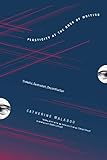Plasticity at the Dusk of Writing : Dialectic, Destruction, Deconstruction / Catherine Malabou.
Material type: TextSeries: Insurrections: Critical Studies in Religion, Politics, and CulturePublisher: New York, NY : Columbia University Press, [2009]Copyright date: ©2009Description: 1 online resource (136 p.)Content type:
TextSeries: Insurrections: Critical Studies in Religion, Politics, and CulturePublisher: New York, NY : Columbia University Press, [2009]Copyright date: ©2009Description: 1 online resource (136 p.)Content type: - 9780231145244
- 9780231521666
- 194 23
- B809.7 .M2313 2010
- B809.7 M353 2012
- online - DeGruyter
- Issued also in print.
| Item type | Current library | Call number | URL | Status | Notes | Barcode | |
|---|---|---|---|---|---|---|---|
 eBook
eBook
|
Biblioteca "Angelicum" Pont. Univ. S.Tommaso d'Aquino Nuvola online | online - DeGruyter (Browse shelf(Opens below)) | Online access | Not for loan (Accesso limitato) | Accesso per gli utenti autorizzati / Access for authorized users | (dgr)9780231521666 |
Browsing Biblioteca "Angelicum" Pont. Univ. S.Tommaso d'Aquino shelves, Shelving location: Nuvola online Close shelf browser (Hides shelf browser)

|

|

|

|

|

|

|
||
| online - DeGruyter The Historiographic Perversion / | online - DeGruyter Collateral Damage : Sino-Soviet Rivalry and the Termination of the Sino-Vietnamese Alliance / | online - DeGruyter Parable and Politics in Early Islamic History : The Rashidun Caliphs / | online - DeGruyter Plasticity at the Dusk of Writing : Dialectic, Destruction, Deconstruction / | online - DeGruyter Stalking the Black Swan : Research and Decision Making in a World of Extreme Volatility / | online - DeGruyter The Novelist's Lexicon : Writers on the Words That Define Their Work / | online - DeGruyter Bailouts : Public Money, Private Profit / |
Frontmatter -- Contents -- Foreword -- Translator'S Introduction -- Variations I -- Afterword of the impossibility of fleeing - plasticity -- Notes
restricted access online access with authorization star
http://purl.org/coar/access_right/c_16ec
A former student and collaborator of Jacques Derrida, Catherine Malabou has generated worldwide acclaim for her progressive rethinking of postmodern, Derridean critique. Building on her notion of plasticity, a term she originally borrowed from Hegel's Phenomenology of Spirit and adapted to a reading of Hegel's own work, Malabou transforms our understanding of the political and the religious, revealing the malleable nature of these concepts and their openness to positive reinvention. In French to describe something as plastic is to recognize both its flexibility and its explosiveness-its capacity not only to receive and give form but to annihilate it as well. After defining plasticity in terms of its active embodiments, Malabou applies the notion to the work of Hegel, Heidegger, Levinas, Levi-Strauss, Freud, and Derrida, recasting their writing as a process of change (rather than mediation) between dialectic and deconstruction. Malabou contrasts plasticity against the graphic element of Derrida's work and the notion of trace in Derrida and Levinas, arguing that plasticity refers to sculptural forms that accommodate or express a trace. She then expands this analysis to the realms of politics and religion, claiming, against Derrida, that "the event" of justice and democracy is not fixed but susceptible to human action.
Issued also in print.
Mode of access: Internet via World Wide Web.
In English.
Description based on online resource; title from PDF title page (publisher's Web site, viewed 02. Mrz 2022)


